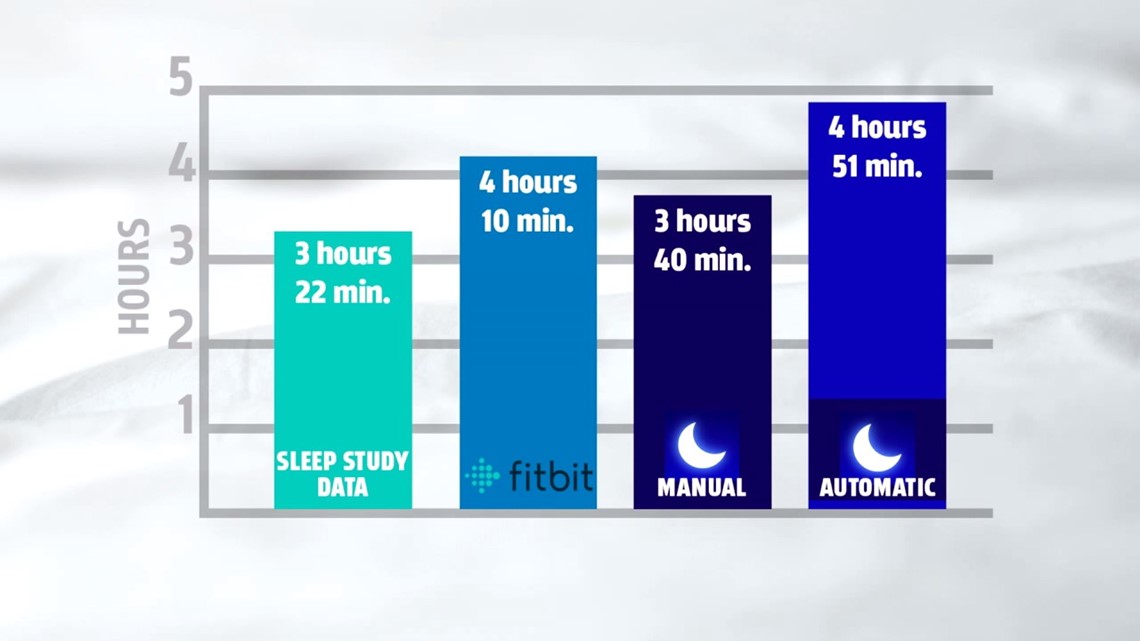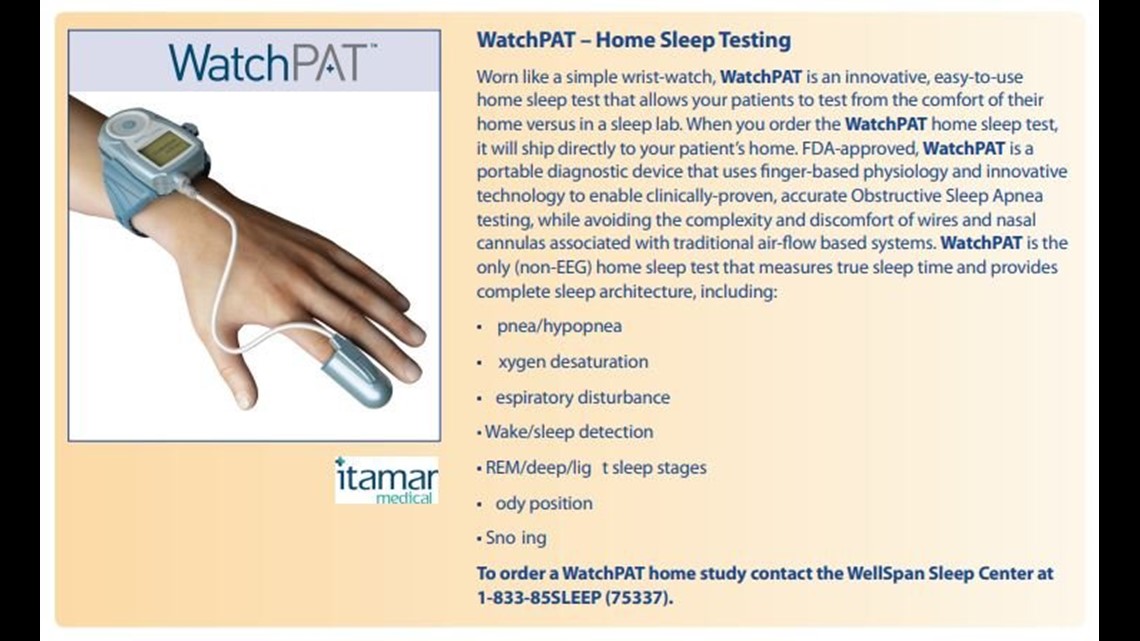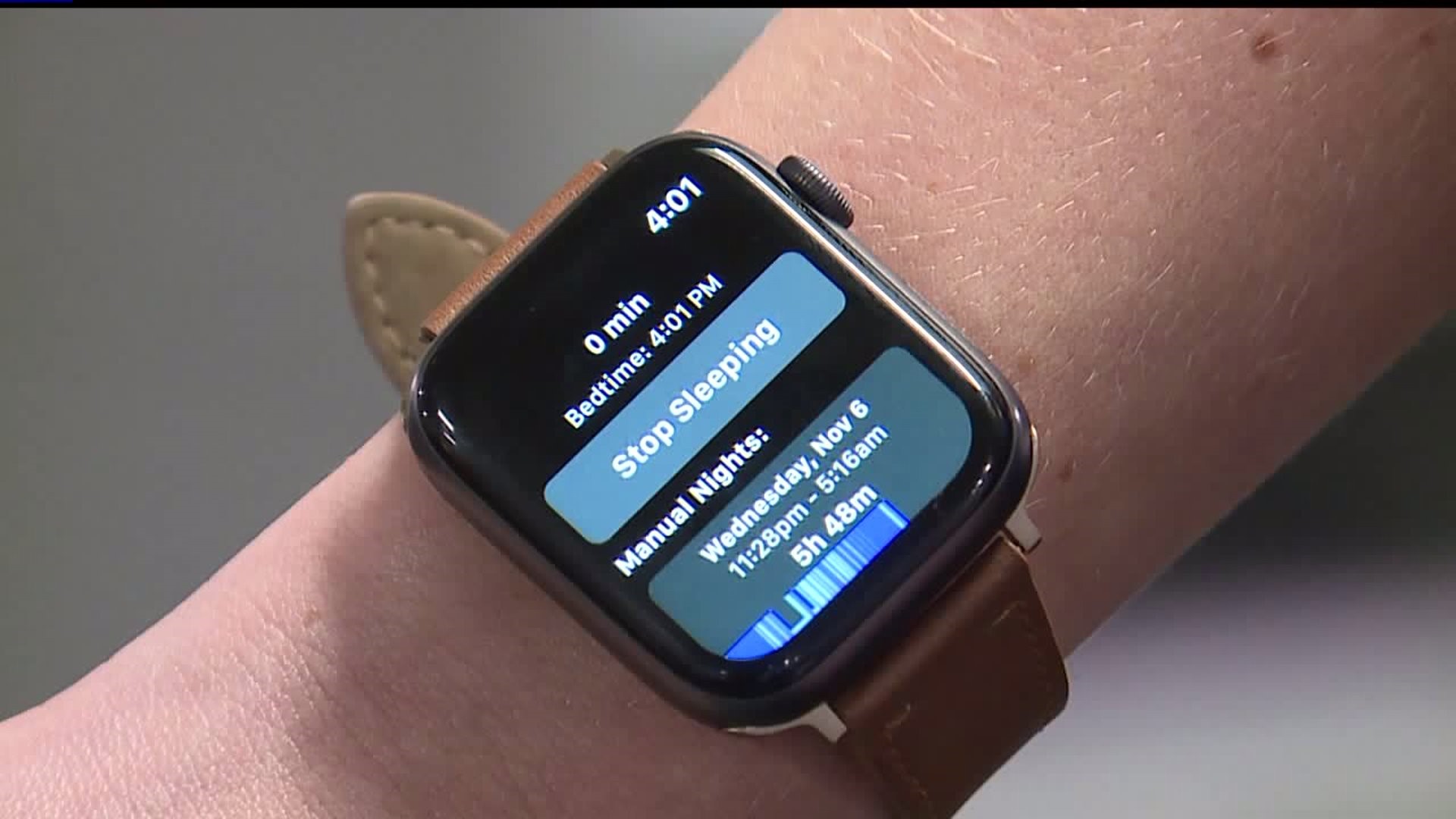You've probably heard this before, but adults are supposed to be getting about 7 hours of sleep each night.
There are plenty of devices that claim to track how long you sleep.
So, FOX43 finds out puts them to the test.
I underwent a sleep study at the Wellspan York Hospital Sleep Center in Dover, York county.
I wore a Fitbit and an apple watch to see how those results compared to the sleep study data.
Sleeping in a sleep center, hooked up to a bunch of devices, means I didn't get the BEST sleep that night - but still enough to compare the data.
I then went over the results with Dr. George Robinson.
He's the medical director of the Sleep Center, WellSpan Pulmonary & Sleep Medicine.
Besides the sleep study gear, I wore a Fitbit charge two device.
I also wore an apple watch and while there are a lot of different apps you can download for the watch, we used the Sleep ++ app.
It gives me an option to track my sleep manually, but hitting a button when I go to sleep and wake up - or it can track it automatically based on my heart rate.
Here are the results:


The sleep study data showed I slept for 3 hours and 22 minutes.
According to the Fitbit app - I slept for 4 hours and 10 minutes.
The manual option on sleep ++ app on the apple watch had me sleeping for 3 hours and 40 minutes.
The automatic option claimed I was restful for 4 hours and 51 minutes.
"Everyone of these overestimated your total sleep time," said the doctor.
The Fitbit app did break down the sleep stages between awake, light, deep and REM sleep, which is rapid eye movement.
Both the sleep study and Fitbit recognized I didn't have any REM sleep.
The app on the apple watch didn't track that.
However, it does seem that manual option on Sleep++ was the most accurate, at least in our FOX43 finds out study.
"This is from the aspect of how much you're sleeping which is good for young healthy people who don't have signs of sleep apnea. That won't tell if you you're stopping breathing at night," said Dr. Robinson.
Signs of sleep apnea
Which I did, twice and neither Fitbit or sleep ++ picked up on that.
The doctor said since I stopped breathing only twice and for less than 10 seconds, he's not concerned.
However, It could be a sign of sleep apnea.
Again, something he says these sleep trackers won't track.
"A lack of oxygen to your heart is called a heart attack, a lack of oxygen to your brain is called a stroke. Sleep apnea is a lack of oxygen to your entire body."
One symptom of sleep apnea, is snoring.
Dr. Robinson said, "Not everyone who snores has sleep apnea, but everyone with sleep apnea snores."
Other symptoms, according to Wellspan, are tossing a turning at night or gasping and choking while you sleep.
Here's what Wellspan says are other signs of sleep apnea and how you can be diagnosed and treated.
What do the makers have to say?
FOX43 Finds Out did reach out to the makers of the Sleep++ app and Fitbit.
Sleep++ never responded.
Fitbit did.
A spokesperson tells us “Fitbit pioneered sleep tracking on the wrist over 10 years ago, making information previously only available through a sleep lab accessible to users on the wrist. We continue to be a leader with over 10.5 billion nights of sleep tracked from people around the globe, helping users better understand their sleep quality, duration and how it impacts their overall health. Fitbit takes accuracy very seriously, and our team continuously performs internal studies to rigorously test the accuracy of our products. Numerous peer-reviewed studies also have validated our sleep technology.”
As for the sleep trackers, the doctor says they may be a lot more comfortable than the gear you have to wear for a sleep study, but they're not as accurate.
"You would get a false sense of security, that may be good, may be bad. I don't know," said Dr. Robinson.
There have been several scientific studies testing the accuracy of sleep trackers fore more than just one night.
What do other studies show?
Here's a study where the devices were used on teenagers and tested the accuracy.
Johns Hopkins also looked into the devices.
Then Fitbit also sent FOX43 the following research:
- A study presented at SLEEP 2017, the leading meeting for sleep scientists and clinicians, demonstrated that Fitbit heart-rate tracking devices accurately track light, REM, and deep sleep stages. Fitbit Sleep Stages use accelerometer data, heart rate variability (the changes in time between beats) and proven algorithms to more accurately estimate how long you spend in light, deep and REM sleep stages (as well as time awake) each night.
- Sleep [academic.oup.com] (April/2018): Researchers from Wright State University support the potential of using wrist-worn devices to continuously monitor sleep duration and quality in children with asthma.
- International Journal of Behavioral Medicine [ncbi.nlm.nih.gov] (March/2015): Researchers from the University of South Australia found that in free-living conditions, consumer-level activity monitors showed strong validity for the measurement of steps and sleep duration, and moderate validity for measurement of total daily energy expenditure (TDEE) and moderate-to-vigorous physical activity (MVPA). Of the devices examined, the Fitbit One and Zip performed the strongest.
- Journal of Psychosomatic Research [ncbi.nlm.nih.gov] (March/2017): Researchers from Gachon University found that the intraclass correlation coefficients of total sleep time and sleep time for Fitbit Flex and polysomnography study groups was excellent, and the frequency of agreement was high in good sleepers but significantly lower in insomnia patients.
- Physiology & Behavior [ncbi.nlm.nih.gov] (March/2016): Researchers from SRI International’s Center for Health Sciences found that the Charge HR showed good agreement with polysomnography (PSG) and electrocardiography (ECG) in measuring sleep and HR during sleep, supporting its use in assessing sleep and cardiac function in healthy adolescents.
- Chronobiology International [ncbi.nlm.nih.gov] (April/2019): Researchers from the University of Texas at Austin, used Charge 2 devices and found that Fitbit photoplethysmography suitably tracks HR during sleep in healthy young adults.
Also, Wellspan says there is technology that can allow people to do an at-home sleep study. Here's more information on that:


If you have a story you want Jackie to look into, FOX43 wants to find out.
Send Jackie a message on Facebook or email FOX43FindsOut@FOX43.com.

